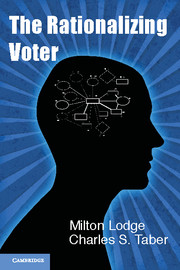Book contents
- Frontmatter
- Contents
- List of Tables
- List of Figures
- Preface
- 1 Unconscious Thinking on Political Judgment, Reasoning, and Behavior
- 2 The John Q. Public Model of Political Information Processing
- 3 Experimental Tests of Automatic Hot Cognition
- 4 Implicit Identifications in Political Information Processing
- 5 Affect Transfer and the Evaluation of Political Candidates
- 6 Affective Contagion and Political Thinking
- 7 Motivated Political Reasoning
- 8 A Computational Model of the Citizen as Motivated Reasoner
- 9 Affect, Cognition, Emotion
- Bibliography
- Index
5 - Affect Transfer and the Evaluation of Political Candidates
Published online by Cambridge University Press: 05 March 2013
- Frontmatter
- Contents
- List of Tables
- List of Figures
- Preface
- 1 Unconscious Thinking on Political Judgment, Reasoning, and Behavior
- 2 The John Q. Public Model of Political Information Processing
- 3 Experimental Tests of Automatic Hot Cognition
- 4 Implicit Identifications in Political Information Processing
- 5 Affect Transfer and the Evaluation of Political Candidates
- 6 Affective Contagion and Political Thinking
- 7 Motivated Political Reasoning
- 8 A Computational Model of the Citizen as Motivated Reasoner
- 9 Affect, Cognition, Emotion
- Bibliography
- Index
Summary
Previous chapters have documented uncontrolled and momentary effects of positive and negative feelings and group cues on the expression of snap judgments for a variety of political objects, including candidates, parties and groups, ideas, and issues. We now turn to a somewhat different question concerning the “downstream” effects of implicit cues on political information processing. Much of the import of our theory derives from the contention that early influences, even small and substantively irrelevant ones, will propagate through subsequent information processing by providing motivation, setting direction, and altering the accessibility of considerations in memory for downstream thought processes.
In this chapter we focus on how information presented both implicitly and explicitly influences how people form and update their impressions of political candidates. In two studies, we experimentally manipulate the similarity between a participant and a fictional politician by matching the participant's responses from a preexperimental questionnaire to the positions the candidate takes in a news article (one version reprinted in Appendix 5A at the end of this chapter). Because similarity is both a strong and uncontroversial predictor of candidate preference and voting behavior – indeed, it is the driving force behind spatial and directional models of electoral competition – we fully expect similarity to foster positive candidate evaluations while dissimilarity should promote more negative evaluations.
- Type
- Chapter
- Information
- The Rationalizing Voter , pp. 115 - 133Publisher: Cambridge University PressPrint publication year: 2013



